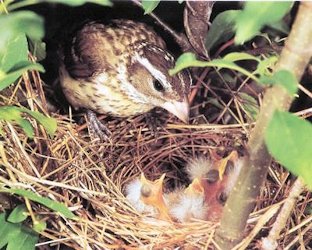
|
Caring for Bird Chicks Do birds make good parents? Male Emperor Penguins, after incubating an egg for nine weeks and then feeding and huddling over their chick for weeks after hatching, certainly deserve credit for effort. But what of the male hummingbird, which never goes near the nest of chicks. Parental care systems vary widely among bird species, and consists of an important component of the different social system. Along with other behavior patterns, parental care systems have evolved to meet the challenge of survival of the species. In general, every adult bird contributes just enough to the child-care effort to give its offspring a reasonable chance to survive and reproduce without greatly decreasing its own opportunity to survive and reproduce in the next season. In some species, one parent contributes nothing to the child-care effort in return for a chance to mate with more than one partner, thereby increasing its number of potential offspring. In other species, including most of the songbirds, both parents share many of the duties of feeding, brooding, and protecting the young birds until they fledge. Return to Bird Nesting Choices |
| Red-Breasted Grosbeak | |
|
Above you can see the nest of a female Red-Breasted Grosbeak. The young of this Rose-breasted Grosbeak are typical of most songbirds, being helpless, blind, and virtually naked at hatching. At this stage the young are totally dependent on their parents for food and protection, and to regulate their body temperature. |
|